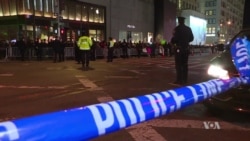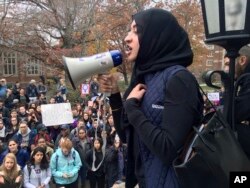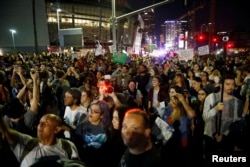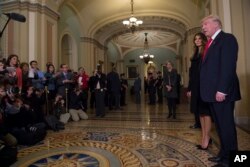Nationwide protests proved to be the first test for President-elect Donald Trump, as he took to twitter Friday morning to reverse an earlier tweet criticizing the negative postelection reaction in some cities as "very unfair."
"Love the fact that small groups of protesters last night have passion for our great country. We will all come together and be proud," Trump wrote, nine hours after posting a less accommodating tweet: "Just had a very open and successful presidential election. Now professional protesters, incited by the media, are protesting. Very unfair!"
The difference between the two tweets reflected the varying tones struck by Trump throughout his campaign, ranging from the politically incorrect statements that struck a chord with many voters to the more disciplined approach taken in the final days of the campaign, when candidate Trump followed a teleprompter for his speeches and stayed on message during rallies.
"You are seeing a president-elect who is beginning to understand that his words matter," said John Hudak, a senior fellow in governance studies at the Brookings Institution, a Washington policy research group. The second tweet, Hudak added, appeared to acknowledge the First Amendment rights of the protesters.
Trump's tweets came in response to a third night of demonstrations in major cities across the United States, with some protesters burning American flags and effigies of Trump. Police in Portland, Oregon, described the protests there as a riot after demonstrators threw projectiles and broke store windows.
Trump secured the nomination by winning 290 Electoral College votes, 62 more than Democratic presidential candidate Hillary Clinton, who won the nationwide popular vote. After a campaign season and an election shaped by the concerns of the white working class, the protests revealed a reversal in political grievances.
"Now the white middle class is not taking seriously the plurality of Americans who voted for Hillary Clinton and the majority of Americans who didn't vote for Donald Trump," Hudak said.
Divided electorate
Many of the president-elect's supporters took to social media to point out that Republicans did not protest in the streets when President Barack Obama was elected eight years ago.
Robin Allweiss, a Tampa, Florida-based lawyer who volunteered with the Trump campaign, said she wasn't upset by the protests because she didn't see them as legitimate political expression.
"If I felt these people were articulate with their reasoning and giving legitimate reasons and they weren't burning flags and they were peaceful and they were strong in their beliefs, then I would be bothered," Allweiss told VOA. She characterized the protesters as paid agitators, an accusation repeated across social media by the president-elect's supporters.
"They are doing this to cause dissension, anger and to scare. I think it's an intimidation factor," Allweiss said.
But Hudak said the accusations of paid, bused-in protesters was a common reaction among the political right.
"These are frustrated people — more people voted for Hillary Clinton than voted for Donald Trump. There are a lot of very unhappy people in this country," he said.
In the days following Trump's surprising win, both Clinton and Obama called for a peaceful transfer of power in keeping with America's political traditions. A respect for the wishes of the electorate and the process of transferring power between outgoing and incoming administrations could be complicated by the divisive dialogue of this election season.
"There's a lot that Donald Trump has said that has divided this nation and has divided a lot of the people you see protesting, but giving him a chance and seeing what he will be like as president and seeing what his policy proposals actually will be is important," Hudak said. "And if you don't like what ends up being part of the Trump administration, then protest against that."
Looking ahead
Trump flouted one key tradition Thursday by not allowing the traveling press pool to document his movements during the now-traditional visit of a president-elect with the sitting president.
The move could signal an antagonistic relationship between a President Trump and the news media, in keeping with the problematic relationship established during the campaign.
"The blaming of the protests on the media certainly signals the way he's going to treat the media in using them as a scapegoat for anything negative that happens in his administration," Hudak said. "But I think it's an important moment for Mr. Trump to take a step back and realize the media is not driving these protesters to the streets. Mr. Trump's own words are driving protesters to the streets."
Despite the protests, Trump's supporters greeted the win with surprise, elation and a hopeful sense of what his administration could accomplish starting in January.
"He is really going to turn the world upside down — he's going to get along with people. He's been an excellent businessman," Allweiss said. "Here is somebody who is actually going to do something. He owes nothing to no one — not a lobbyist, not a special-interest group."








